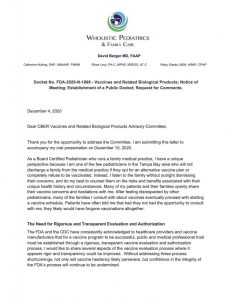The FDA Vaccines and Related Biological Products Advisory Committee will meet December 17, 2020 to discuss the Emergency Use Authorization (EUA) of the Pfizer COVID-19 Vaccine. Dr. David submitted the following letter in advance of the committee meeting.
Docket No. FDA-2020-N-1898 – Vaccines and Related Biological Products; Notice of Meeting; Establishment of a Public Docket; Request for Comments.
December 4, 2020
Dear CBER Vaccines and Related Biological Products Advisory Committee,
Thank you for the opportunity to address the Committee. I am submitting this letter to accompany my oral presentation on December 10, 2020.
As a Board Certified Pediatrician who runs a family medical practice, I have a unique perspective because I am one of the few pediatricians in the Tampa Bay area who will not discharge a family from the medical practice if they opt for an alternative vaccine plan or completely refuse to be vaccinated. Instead, I listen to the family without outright dismissing their concerns, and do my best to counsel them on the risks and benefits associated with their unique health history and circumstances. Many of my patients and their families openly share their vaccine concerns and hesitations with me. After feeling disrespected by other pediatricians, many of the families I consult with about vaccines eventually proceed with starting a vaccine schedule. Patients have often told me that had they not had the opportunity to consult with me, they likely would have forgone vaccinations altogether.
The Need for Rigorous and Transparent Evaluation and Authorization
The FDA and the CDC have consistently acknowledged to healthcare providers and vaccine manufacturers that for a vaccine program to be successful, public and medical professional trust must be established through a rigorous, transparent vaccine evaluation and authorization process. I would like to share several aspects of the vaccine evaluation process where it appears rigor and transparency could be improved. Without addressing these process shortcomings, not only will vaccine hesitancy likely persevere, but confidence in the integrity of the FDA’s process will continue to be undermined.
One example of the concerns many public health and medical professionals (including myself) share, is we are being asked to provide comments – in this case on the Pfizer vaccine – without having had the opportunity to review the safety and efficacy of the data. In fact, my very writing of this letter had to occur without having any data to review before submitting my comments.
As another example, the June 2020 Development and Licensure of Vaccines to Prevent COVID-19 Guidance for Industry stated:
Although establishing vaccine safety and efficacy in SARS-CoV-2 naïve individuals is critical, vaccine safety and COVID-19 outcomes in individuals with prior SARS-CoV-2 infection, which might have been asymptomatic, is also important to examine because pre-vaccination screening for prior infection is unlikely to occur in practice with the deployment of licensed COVID-19 vaccines. Therefore, COVID-19 vaccine trials need not screen for or exclude participants with history or laboratory evidence of prior SARS-CoV-2 infection. However, individuals with acute COVID-19 (or other acute infectious illness) should be excluded from COVID-19 vaccine trials. (Source: https://www.fda.gov/media/139638/download)
Based on the FDA’s own assessment, we must be provided sufficient data to assess how patients who clinically recovered from COVID-19 fared from receiving a vaccine.
Building Public Confidence and the Concept of Informed Consent
To garner public and professional confidence in the process of evaluating and authorizing vaccines, and in the committee itself, it is imperative that vaccine clinical trial data is subjected to meaningful public scrutiny in advance of issuing any potential EUA. By definition, a person cannot give true informed consent to any treatment or course of action, including a vaccine, unless the individual and professional team have been provided sufficient information by which to properly weigh the risks and benefits.
Comprehensive reporting on the following topics would help elicit confidence in the authorization process, and provide patients and medical providers the necessary data to make informed, confident decisions about taking the vaccine:
- Ongoing post-vaccine studies of definable subpopulations, including different ethnicities, nationalities; various socioeconomic groups; those with pre-existing allergic, hyperinflammatory, and autoimmune conditions; pediatric and geriatric patients
- Details of post-vaccine adverse events
- Identification of specific vaccine and batch number administered to each individual included in the data
- Vaccine effects on currently-infected and previously-infected COVID-19 patients
- Minimum of six-months tracking patients to assess longer-term side effects; particularly, the development of autoimmune and hyper-inflammatory conditions, such as those listed in other vaccine package inserts
- Post-vaccine protective rates, including surveillance of IgG antibodies to various SARS-CoV-2 proteins
- What IgG antibody level is considered protective
A Successful Vaccine Program to Manage this Virus
Our country has an opportunity to make significant strides towards quelling this terrible virus; however, if hesitancy about the vaccine persists, success in combating the virus will continue to elude us. The actions taken by this Committee and the FDA will go a long way in determining the success of the COVID-19 vaccination program.
Sincerely,

Board Certified Pediatrician
Owner and Medical Director, Wholistic Pediatrics and Family Care
Assistant Professor, University of South Florida College of Nursing
3405 W Fletcher Avenue
Tampa, FL 33618
(813) 960-3415
www.wholisticfamilycare.com
DOWNLOAD DR. DAVID’S LETTER HERE:

